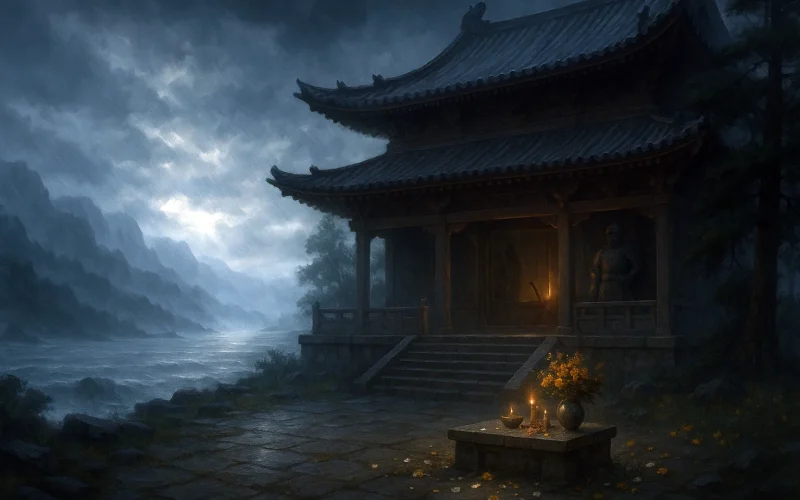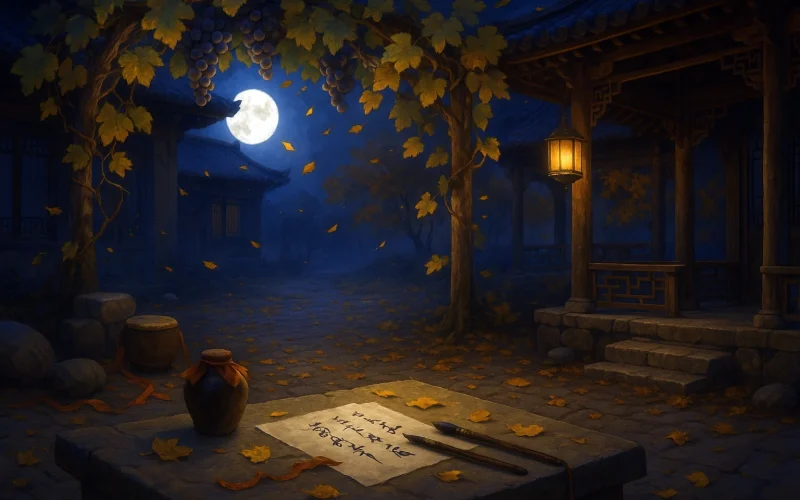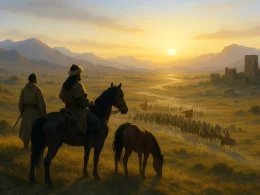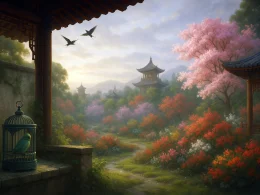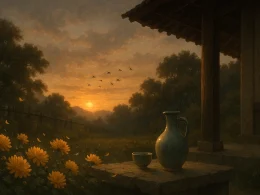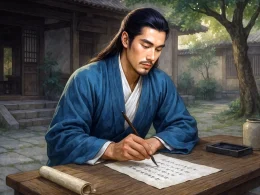Of all the generals who restored our land,
Who was the peerless hero, proud and grand?
Though born in weeds, though dead and gone,
His wrath still fills his breast—he lives on!
Young from River North he rose,
Bent two-stone bows, three-foot sword chose,
Pacified Xiang and Han,
Opened Guo and Luo,
Cleansed Dongting's span.
Northward to the capital he gazed—
Cunning hares still lurked, but hounds were razed.
Passing old camps, I see in Jing and E
Survivors weep for their general, woe!
They tell his tale with bitter hate:
"No royal order sealed his fate!
True or false? Who can know?
'Guilty, your Majesty!'
Yet judge my heart's true glow."
Through all eternity,
No fief was e'er bestowed
On those vile traitors' road.
Night cloaked the world, then daylight came,
Truth blazed at last, cleared his good name.
In death he bows a hundred times,
Grateful for imperial grace sublime.
See each March, flowers bloom below,
As sacred rites his spirit show.
Original Poem
「六州歌头 · 题岳鄂王庙」
中兴诸将,谁是万人英?
身草莽,人虽死,气填膺,尚如生。
年少起河朔,弓两石,剑三尺,
定襄汉,开虢洛,洗洞庭。
北望帝京,狡兔依然在,良犬先烹。
过旧时营垒,荆鄂有遗民。
忆故将军,泪如倾。说当年事,知恨苦:不奉诏,伪耶真?
刘过
臣有罪,陛下圣,可鉴临,一片心。
万古分茅土,终不到,旧奸臣。
人世夜,白日照,忽开明。
衮佩冕圭百拜,九泉下、荣感君恩。
看年年三月,满地野花春,卤簿迎神。
Interpretation
Composed during Emperor Ningzong's reign after Yue Fei's posthumous vindication, this ci by Liu Guo stands as a thunderous elegy at the Yuewang Temple. As an ardent advocate for resisting the Jin invasion, Liu channels his reverence for the wronged general into a tripartite lament: mourning martyred loyalty, condemning treacherous ministers, and imploring imperial renewal of Yue's warrior spirit. The work merges historical indictment with spiritual homage, transforming stone memorials into living calls for justice.
First Stanza: "中兴诸将,谁是万人英?身草莽,人虽死,气填膺,尚如生。年少起河朔,弓两石,剑三尺,定襄汉,开虢洛,洗洞庭。北望帝京,狡兔依然在,良犬先烹。过旧时营垒,荆鄂有遗民。忆故将军,泪如倾。"
Zhōngxīng zhū jiàng, shuí shì wàn rén yīng? Shēn cǎo mǎng, rén suī sǐ, qì tián yīng, shàng rú shēng. Nián shào qǐ hé shuò, gōng liǎng dàn, jiàn sān chǐ, dìng xiāng hàn, kāi guó luò, xǐ dòng tíng. Běi wàng dì jīng, jiǎo tù yī rán zài, liáng quǎn xiān pēng. Guò jiù shí yíng lěi, jīng è yǒu yí mín. Yì gù jiāng jūn, lèi rú qīng.
Among restoration's generals,
who was the peerless hero?
Though buried in wilderness,
dead yet still breathing—
his wrathful spirit lives!
Youth rose north of Yellow River,
bowed two-stone archery,
wielded three-foot blade,
secured Xiangyang,
opened Luoyang's gates,
cleansed Dongting's waves.
Gazing north to capital—
while cunning hares survived,
the faithful hound was slaughtered.
Passing old barracks now,
Jing-Hu's people remember.
Recalling their general,
tears pour like rivers.
Liu's opening salvo elevates Yue beyond mortal measure—"dead yet still breathing" (人虽死,气填膺) fuses corpse and ghost into enduring force. The rapid-fire victories ("secured Xiangyang… cleansed Dongting") become geographic liturgy. "Cunning hares survived" (狡兔依然在) vilifies Qin Hui's faction as vermin, while "faithful hound slaughtered" (良犬先烹) indicts the regime's perverted justice. The stanza culminates in living witness: commoners' tears (泪如倾) baptize Yue's memory in collective grief.
Second Stanza: "说当年事,知恨苦:不奉诏,伪耶真?臣有罪,陛下圣,可鉴临,一片心。万古分茅土,终不到,旧奸臣。人世夜,白日照,忽开明。衮佩冕圭百拜,九泉下、荣感君恩。看年年三月,满地野花春,卤簿迎神。"
Shuō dāngnián shì, zhī hèn kǔ: bù fèng zhào, wěi yē zhēn? Chén yǒu zuì, bìxià shèng, kě jiàn lín, yī piàn xīn. Wàn gǔ fēn máo tǔ, zhōng bú dào, jiù jiān chén. Rénshì yè, bái rì zhào, hū kāi míng. Gǔn pèi miǎn guī bǎi bài, jiǔ quán xià, róng gǎn jūn ēn. Kàn nián nián sān yuè, mǎn dì yě huā chūn, lǔ bù yíng shén.
Speaking of those days,
know this bitter truth:
His "disobeyed decree"—
was it crime or lie?
"This guilty subject…"
May Your Majesty's wisdom
witness his true heart!
Through all eternity,
fiefdoms never reach
treacherous ministers.
When human night
met daylight's blaze—
sudden vindication!
In imperial robes you bowed
nine times before his shrine—
below the springs,
he feels your grace.
See each third moon:
wildflowers blanket earth,
processions honor spirits.
The stanza unfolds as judicial inquest. "Disobeyed decree—/was it crime or lie?" (不奉诏,伪耶真) cross-examines history's false charges. "Fiefdoms never reach treacherous ministers" (万古分茅土,终不到,旧奸臣) declares cosmic justice—traitors eternally barred from honor. "Human night met daylight's blaze" (人世夜,白日照) transforms political rehabilitation into spiritual epiphany. The emperor's "nine bows" (百拜) perform imperial atonement, while "wildflowers blanket earth" (满地野花春) signals nature's participation in Yue's apotheosis.
Holistic Appreciation
Liu constructs a poetic trial where history is judged and redeemed. The first stanza establishes evidence through martial geography ("secured Xiangyang") and living testimony ("tears pour like rivers"). The second stanza becomes closing argument—exposing false charges, affirming natural law against traitors, and finally staging imperial penance through ritual ("nine bows").
The work's genius lies in its temporal alchemy: Yue's physical death ("buried in wilderness") becomes political resurrection ("sudden vindication"), then achieves mythic permanence ("processions honor spirits"). Liu positions the temple as temporal hinge—where past injustice meets present reckoning and future memory.
Artistic Merits
- Judicial rhetoric
The interrogation "was it crime or lie?" (伪耶真) frames historical inquiry as courtroom drama. - Luminous jurisprudence
"Human night met daylight's blaze" (人世夜,白日照) makes vindication a cosmological event. - Terrestrial theology
"Wildflowers blanket earth" (满地野花春) transforms seasonal rebirth into sacred commemoration. - Numinal bureaucracy
"Nine bows before his shrine" (百拜) renders imperial ritual as spiritual reinstatement.
Insights
Liu's poem reveals how memorials function as temporal portals. Yuewang Temple becomes a site where "nine springs below" (九泉下) communicates with "third moon's wildflowers" (三月野花春)—connecting underworld, human realm, and seasonal eternity.
For modern readers, the work models historical truth-telling: Liu's unflinching "cunning hares survived" indictment reminds us that reconciliation requires naming perpetrators. The "wildflower processions" offer hope—that collective memory can transform political murder into communal sacrament.
Ultimately, the poem suggests that justice flows vertically: the emperor's bows to the wronged general realign cosmic order. Liu's vision—where rulers bow to martyrs—remains revolutionary: a world where power kneels before principle, and wildflowers grow thicker where blood once soaked the earth.
About the Poet
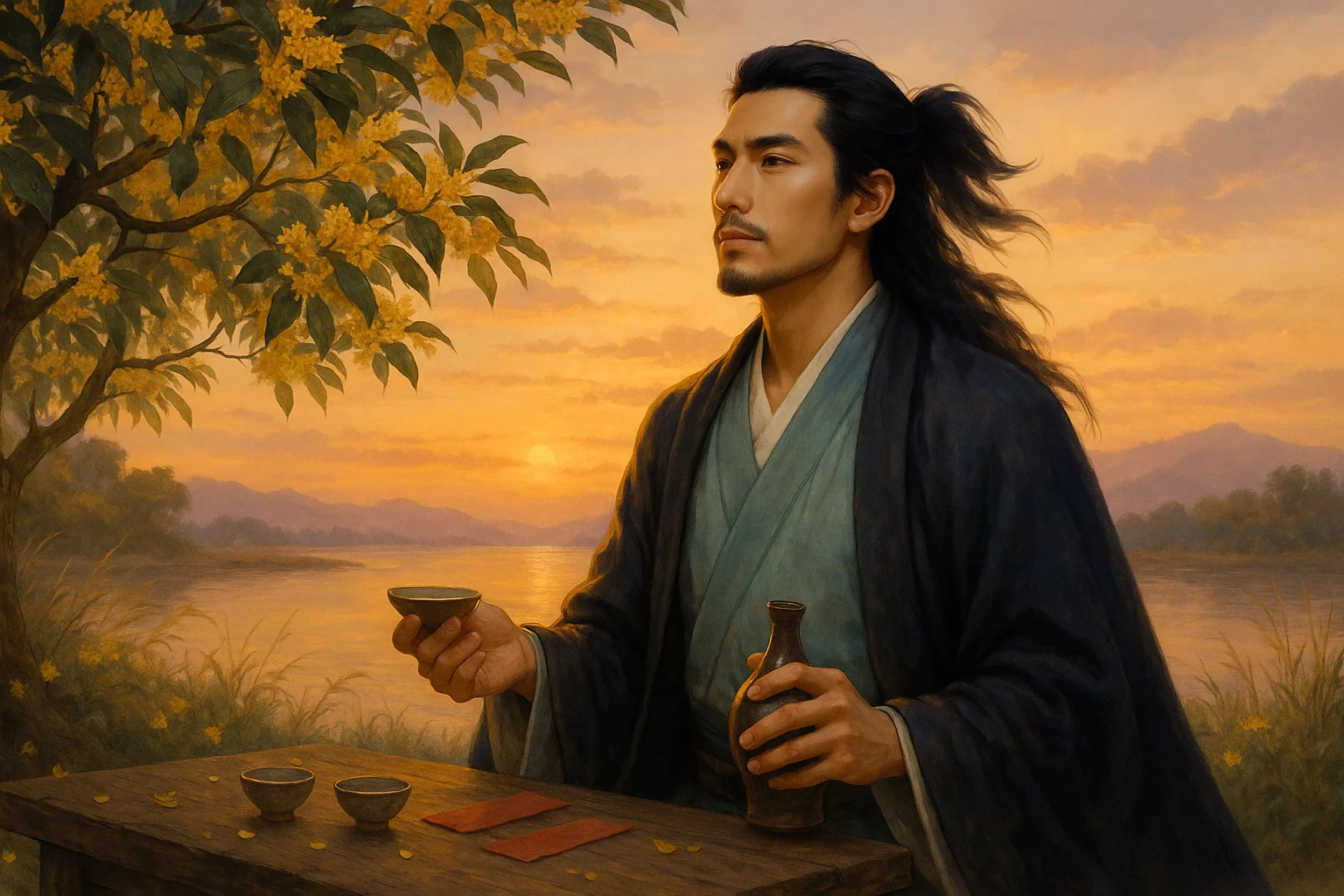
Liu Guo (刘过 1154 - 1206), a native of Taihe in Jiangxi, was a ci poet of the Bold and Unconstrained School (haofang pai) during the Southern Song Dynasty. Though he remained a commoner all his life, wandering the rivers and lakes, he associated with literary giants like Lu You and Xin Qiji. His ci poetry is impassioned and heroic, and his verse is vigorous and forceful. Stylistically close to Xin Qiji but even more unrestrained, Liu Guo became a central figure among Xin’s poetic followers.






